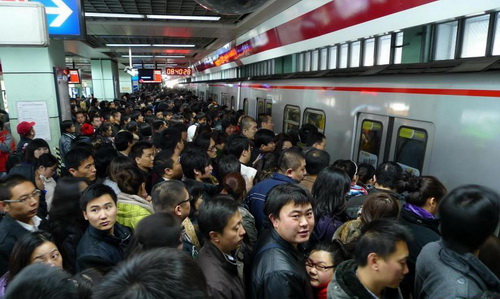By Tom McGregor, CCTV.com Panview Opinion Page commentator and editor
As of Jan. 2017, the Beijing Metro Subway System is the world’s longest in operation - 574 kilometers in length with plans to increase to 999-km by the end of 2021.
2017 is expected to be the busiest year on record for expansion with 2 new lines to start construction and 18 other projects still underway.
Local Municipal transport officials have big plans to connect subway lines from the surrounding Hebei Province with the capital City.
New intercontinental transport lines (railways, buses and subways) are expected to play vital roles in creating a Beijing-Tianjin-Hebei Megaplex, holding an urbanized population at over 50 million people by 2030.
That’s huge, but let’s face it that means the Beijing Subway System, the most crowded on the globe, will get even more congested. Drastic solutions are needed to resolve rush hour jams.

Time to consider 24/7 operations
Beijing is not similar to London, Tokyo, Hong Kong or New York, meaning the city lacks a wild nightlife atmosphere. After midnight if you find yourself roaming the streets, much of the capital city stands empty.
Yet, Beijing should become a city that never sleeps. It’s the central location for the Chinese government and the country’s media. While most Chinese are asleep, the Western Hemisphere is wide awake.
For high-level officials and media figures in Beijing, they must stay updated on BREAKING NEWS in Europe, the Middle East, Africa and Americas. And if emergencies ensue people should have accessible citywide transportation even at 2 am in the morning.
Keeping major lines of Beijing’s subways running through and around the CBD (Central Business District) can be helpful for those who work graveyard shifts as well.
Make rush hour compromises
Beijing’s population is about 22 million, but that’s not counting migrant workers from rural China who flood into the capital city each year. Some estimate Beijing’s real population hovers at over 30 million.
Local transit officials say around 11 million passengers take the subway daily with traffic expected to increase to 18.5 million per day by 2021. Subway lines keep expanding, but all lines stay crowded during rush hour.
Companies should offer more flexible working hours for employees to alleviate rush hour commutes. Some employees may prefer arriving at the office at 7 or 8 am, while others would like to sleep in and stay late.
Do all office workers really have to work from 9 am to 6 pm? If not necessary, proper adjustments should be implemented.
Round-the-clock city as global trend
Meanwhile, Chinese President Xi Jinping is touting a more inclusive globalized society. Nevertheless, the Beijing Subway system continues to operate at traditional hours, remaining stubborn to old-fashion thinking.
China is the world’s second largest economy and seeks to connect more closely with global financial markets. By keeping subways operational 24/7, many office workers employed in finance-related sectors can go to the office during Beijing’s night shift.
The added benefit would be reduced subway congestion during rush hour. A globalized Beijing subway can show a cosmopolitan face to China’s capital city.
The subways in New York and London currently operate 24/7. New York is the world’s financial capital, while London is an international banking hub.
Beijing is not Shanghai, the nation’s finance capital, but it’s where the nation’s government leaders reside nonetheless.
Beijing doesn’t need sleep
When New York had risen to prominence, there was the myth it was the city that never sleeps. The workaholic image had made New York more attractive landing point for global investors.
Accordingly, China is emerging as a global economic powerhouse and that means longer working hours for people working in finance in Beijing.
They are making China a much richer nation and they deserve the subway which runs 24/7 so they can go to and from work whenever they please.
(The opinions expressed here do not necessarily reflect the opinions of Panview or CCTV.com)

Panview offers a new window of understanding the world as well as China through the views, opinions, and analysis of experts. We also welcome outside submissions, so feel free to send in your own editorials to "globalopinion@vip.cntv.cn" for consideration.















